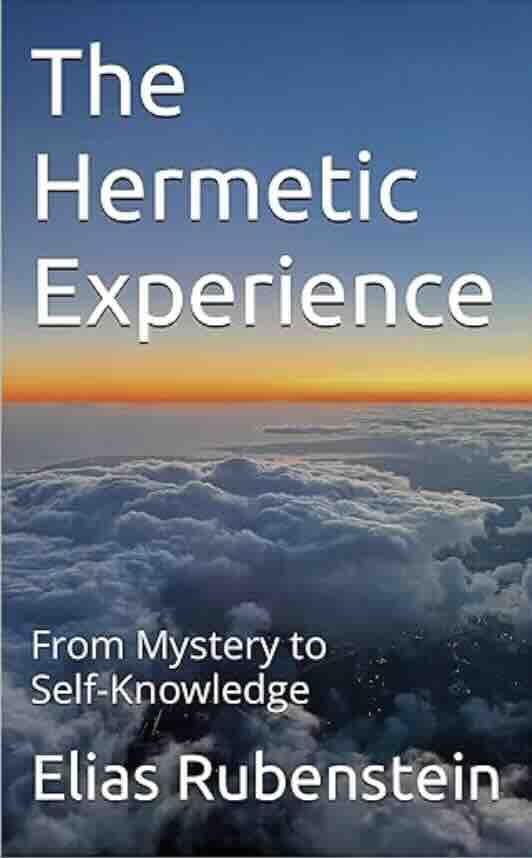
The Hermetic Experience: From Mystery to Self-Discovery
Elias Rubenstein
In this book, Elias Rubenstein offers an unprecedented approach to Hermeticism.
Introduction
“The Hermetic Experience: From Mystery to Self-Knowledge” by Elias Rubenstein explores the ancient wisdom and spiritual practices rooted in Hermeticism, an esoteric tradition attributed to Hermes Trismegistus. Rubenstein’s book offers a detailed examination of the spiritual path to self-knowledge, drawing from a diverse array of historical, philosophical, and mystical sources.
Origins and Evolution of Hermeticism
Hermeticism as described in “The Hermetic Experience: From Mystery to Self-Knowledge” traces its origins to ancient Egypt, where the sacred rituals and esoteric knowledge were believed to harmonize cosmic energies and guide individuals toward spiritual enlightenment. Hermes Trismegistus, a syncretic figure combining the Greek god Hermes and the Egyptian god Thoth, symbolizes the fusion of Greek and Egyptian spiritual traditions. The Hermetic teachings, encapsulated in texts such as the Corpus Hermeticum, emphasize the interconnectedness of the macrocosm and microcosm, the transformative power of alchemy, and the pursuit of self-knowledge.
Hermeticism in the Renaissance
The Renaissance marked a significant revival of Hermeticism, spurred by the rediscovery of classical texts and the influence of Neoplatonism. Scholars like Marsilio Ficino and Giovanni Pico della Mirandola integrated Hermetic ideas into their philosophical frameworks, blending spirituality, mysticism, and natural sciences. The invention of the printing press facilitated the dissemination of Hermetic texts, making this ancient wisdom accessible to a broader audience.
Hermeticism in the Modern Age
In the modern era, Hermeticism as mentioned in “The Hermetic Experience: From Mystery to Self-Knowledge” experienced a resurgence through various esoteric societies and occult movements. The Hermetic Order of the Golden Dawn, founded in the late 19th century, incorporated Hermetic principles into its teachings, attracting prominent members and influencing Western esotericism. Other organizations, such as the Theosophical Society and Ordo Templi Orientis, also played pivotal roles in preserving and propagating Hermetic knowledge.
Core Concepts and Practices
Central to Hermeticism is the principle of self-knowledge, which entails understanding one’s thoughts, emotions, motives, and the true nature of reality. This journey of self-discovery is guided by the adage “Know Thyself,” a tenet shared with ancient Greek philosophy and other spiritual traditions. Hermeticism also emphasizes the transformative power of alchemy, not merely as a means of transmuting base metals into gold but as a metaphor for the spiritual purification and enlightenment of the soul.
Tools of Self-Realization
Rubenstein outlines various tools and practices in “The Hermetic Experience: From Mystery to Self-Knowledge” for achieving self-realization within the Hermetic framework. These include:
- Ethics of Righteousness: Adhering to moral principles and virtues to align one’s actions with cosmic harmony.
- High Art of Meditation: Engaging in meditation to quiet the mind, focus on the divine, and achieve inner peace.
- The Magic of Ritual: Performing rituals that symbolize and enact spiritual truths, facilitating connection with higher realms.
- The Cosmology of Kabbalah: Understanding the Kabbalistic Tree of Life and its pathways as a map for spiritual ascent.
- The Spiritual Dimension of Alchemy: Viewing alchemical processes as symbolic of inner transformation and enlightenment.
- The Hidden Power of The Tarot: Utilizing tarot cards for divination and self-reflection, accessing deeper spiritual insights.
Intercultural Influences and Comparisons
Rubenstein draws in “The Hermetic Experience: From Mystery to Self-Knowledge” parallels between Hermeticism and other spiritual traditions, including Hinduism, Buddhism, and Taoism. Each of these traditions offers unique perspectives on self-realization and spiritual practices, yet they all converge on the goal of transcending the material world and achieving inner enlightenment.
- Hinduism: Focuses on the union of the individual soul with the divine through practices like yoga, meditation, and devotion to deities.
- Buddhism: Emphasizes the Four Noble Truths and the Eightfold Path as means to overcome suffering and attain enlightenment.
- Taoism: Advocates living in harmony with the Tao, the fundamental principle that underlies the universe, through practices like Tai Chi, Qigong, and inner alchemy.
Conclusion
“The Hermetic Experience” serves as a comprehensive guide to the principles and practices of Hermeticism, offering readers a pathway to self-knowledge and spiritual enlightenment. By exploring the rich heritage of this esoteric tradition, Rubenstein provides insights into the universal quest for truth, harmony, and the realization of one’s divine potential. Through the lens of Hermeticism, individuals are encouraged to embark on a transformative journey that transcends the mundane and connects them with the profound mysteries of existence.
CONTENT:
Hermeticism In The Renaissance
Hermeticism In The Modern Age
The Complexity of Spirituality
Self-Realization In Hinduism
Liberation From Suffering in Buddhism
Spiritual Practices in Indigenous Cultures
Of The Americas
A Look at the West
Tools of Self-Realization
Ethics of Righteousness
High Art of Meditation
The Magic of Ritual
Map of Self-Knowledge
The Cosmology of Kabbalah
Kabbalistic Mysteries: Tree of Life, Tzimtzum, & Shekhinah
Paths to Cosmic Harmony
The Spiritual Dimension of Alchemy
Symbols Of The Alchemical Process
The Philosopher’s Stone: A Metaphor for Transformation
The Alchemical Path to Enlightenment
The Hidden Power of The Tarot
The Major Arcana – A Spiritual Odyssey
The Minor Arcana – Contact With Higher Worlds
Astrology in a Hermetic Light
Harmonization of The Twelve Zodiac Signs
Hermeticism in Everyday Life
Secrets of Transmutation
Conclusion
Glossary of Hermetic Terms
